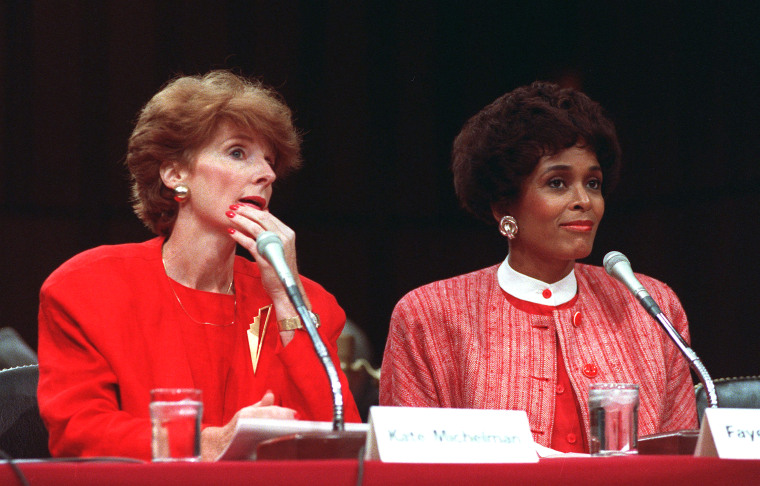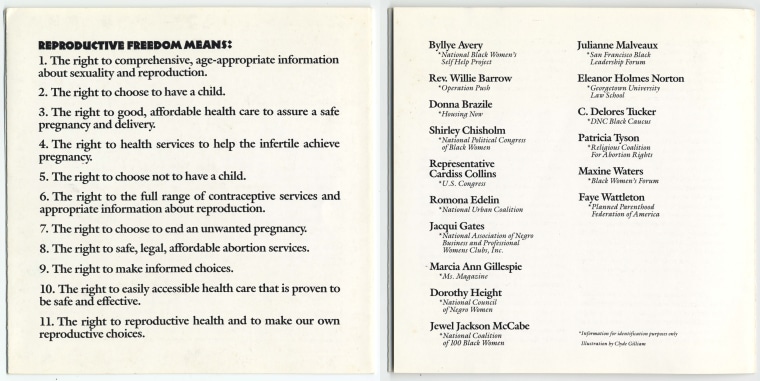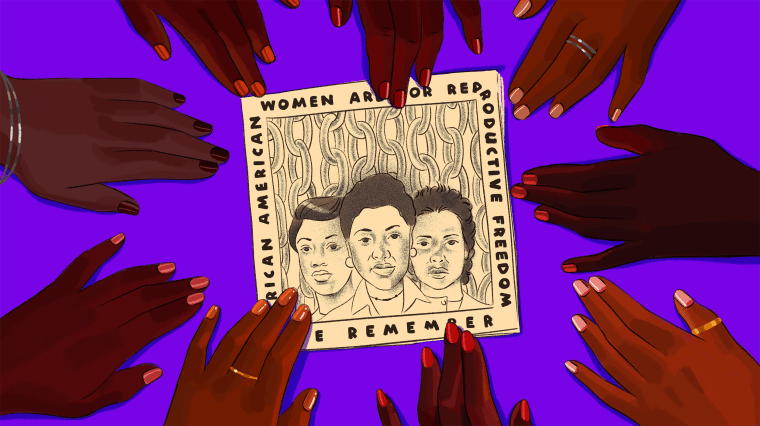Faye Wattleton, the first Black woman to serve as president of Planned Parenthood, stood on the steps of the Supreme Court in the summer of 1989 to condemn its decision on the abortion rights case Webster v. Reproductive Health Services. The high court had ruled that states had the right to limit abortion access.
''This Supreme Court decision once more slaps poor women in the face and says you do not have constitutional protections if your state sees fit to restrict them, and you do not have the resources to circumvent those restrictions,'' Wattleton said, according to a New York Times report from August 1989. ''The court says certain fundamental protections that are part of your human dignity and part of being a respected and decent human being are not yours.''
The Webster decision upheld a Missouri law that restricted state funded abortions at public facilities and public employees from conducting abortions, prohibited counseling in support of abortion, and stated doctors were to conduct viability tests for the fetus when a woman was 20 weeks pregnant or longer. Opponents of the ruling saw this as a threat to the 1973 landmark decision in Roe v. Wade, which affirmed that access to safe and legal abortions is a constitutional right.

Wattleton and other Black activists, lawmakers and civil rights icons were fed up with the new debate about women’s right to choose. Largely, the voices of Black women had been left out of the conversation around abortion access.
Until the summer of 1989.
That year, 16 Black women made history by publishing the first collective statement advocating for equal access to abortion, “We Remember: African-American Women are for Reproductive Freedom.” Retired U.S. Rep. Shirley Chisholm, soon-to-be-elected U.S. Rep. Maxine Waters and civil rights activist Dorothy Height were among the notable names who signed the unprecedented brochure. Many points in the pamphlet amplified some of Wattleton’s statements that day in front of the Supreme Court.
“Now once again somebody is trying to say that we can’t handle the freedom of choice,” the document said. “Only this time they’re saying African-American women can’t think for themselves and, therefore, can’t be allowed to make serious decisions. Somebody’s saying that we should not have the freedom to take charge of our personal lives and protect our health, that we only have limited rights over our bodies.”
September marks 30 years since the statement was first distributed, at anti-apartheid demonstrations, anti-rape rallies and other public venues. In commemorating this public statement, there are some parallels to the state of abortion access in today’s America. Under the Trump administration, reproductive health advocates say Roe v. Wade could be overturned which, experts say, could have devastating effects for low-income women of color. As of 2014, Black women are 28 percent of those who sought abortions, compared to 36 percent of white women and 25 percent of Hispanic women, according to the Guttmacher Institute. Meanwhile, 60 percent of Black American adults say abortions should be legal in all or most cases, according to a Pew Center Research report in 2018.
It was against a similar backdrop that Black women banded together to create the “We Remember” brochures. Ordinary Black women who felt ashamed to discuss their abortions publicly now had the support of some of the most powerful Black women in the country. The brochure supported their rights to have complete ownership over their bodies and addressed how racism and poverty also impacted those decisions.
“We, Black women, who have been very active in reproductive politics for a long time felt like we were leaders without a constituency,” said Loretta Ross, a professor at Arizona State University in Phoenix, an organizer of the brochure and co-founder of the reproductive justice movement in 1994. “We represented the Black women who walked into the clinics, but no one had given them permission to own up to what they were doing. They were speaking with their feet rather than with their mouth.”
THE MAKING OF A MOVEMENT
Following the Supreme Court ruling, Donna Brazile, a founding member and organizer with the National Political Congress of Black Women, arranged a conference call with prominent Black women including Ross, then-director of the women of color program at the National Organization for Women, and Byllye Avery, founder of the National Black Women’s Health Project, which is now the Black Women’s Health Imperative.
The National Political Congress of Black Women and the National Coalition of 100 Black Women were among the few Black women's organizations who spoke out proactively on abortion rights, according to Ross.
“A number of them spoke out, but you had to persuade them because they were afraid of alienating what they perceived as their religious membership,” the activist said. There was also the stigma that supporting the right to abortion meant supporting Black genocide. Not everyone who was on the call signed the document, Ross explained.
Avery, who Ross described as having the strongest standing in the reproductive freedom movement in the Black community, suggested the group write a pamphlet, the most common form of distributing new ideas in the public forum in the era before political hashtags spread the word about campaigns. The pamphlet would act as a permission slip to speak out about abortion access, Avery argued, as many leaders were afraid to be punished by their constituencies for supporting the right to choose.

Planned Parenthood sponsored production of the 250,000 “We Remember” pamphlets in the summer of 1989. The statement, written by former Ms. editor Marcia Gillespie, connected the lack of reproductive freedom to other forms of oppression suffered by the African-American community until that moment such as slavery, Jim Crow laws and voting disenfranchisement.
Ultimately Ross says she thought, no matter their history, Black women needed to have access to reproductive freedom and justice.
“The feminist in me said we deserve abortion rights whether we had ever been enslaved or not,” she said. “It's our human right.”
THE IMPACT OF “WE REMEMBER”
The brochure was the first part of a series of signature campaigns in the late 1980s-early 1990s in which Black women and women of color used their voices to impact public policy and raise awareness around sexism and racism. In 1991, black scholars gathered signatures from 1,600 Black women and took out an advertisement in the New York Times in support of Anita Hill, who faced scrutiny for testifying in judiciary hearings against Supreme Court Justice Clarence Thomas, whom she accused of sexual harassment.
Then came the full-page ad, “Black Women on Health Care Reform,” which was signed by 836 Black women including novelist Alice Walker and political activist Angela Davis and published in the Washington Post and Roll Call in August 1994, according to the book Reproductive Justice. The printing was organized by the 16 Black women who launched the reproductive justice movement to address the intersection of social justice and reproductive health in June 1994.
The collective, which called itself the Women of African Descent for Reproductive Justice, was responding to the Clinton administration's proposed 1993 Health Security Act, which did not address reproductive issues that disproportionately harmed Black women, such as poverty, intimate partner violence, infant mortality and morbidity, environmental issues and HIV/AIDS.
To further push their message, the WADRJ and the Women of Color Partnership Program of the Religious Coalition of Reproductive Choice also republished “We Remember” with 29 more signatures from Black women in 1994. The second iteration of the brochure is also tied to the founding of the reproductive justice movement, Toni Bond Leonard, who was part of organizing the reissue, explained.
“We were still fighting for Black women to be able to discuss abortion and also to be trusted as moral agents with the capacity to make decisions about our bodies,” Bond said.
Because mainstream pro-choice organizations traditionally didn’t speak out on the racism Black women faced, an experience that impacted their reproductive health, they weren’t satisfied with those spaces representing them either.
“It enabled us to center ourselves and talk about our lived experiences in ways that the reproductive health and reproductive rights movement didn't allow us to do, and so what you had was basically Black women and other women of color create their own movement,” Bond said.
WHY BLACK WOMEN SHOULD HAVE ABORTION ACCESS
Bond and Ross stood on the shoulders of Black women before them who sought access to family planning services and abortion whether it was accessible to them or whether it was something they took into their own hands. For instance, late surgeon and Tennessee legislator Dr. Dorothy Lavinia Brown introduced a bill in 1967 — which didn’t pass — to legalize abortion caused by rape or incest. In 1965, women of color were most likely to die from illegal abortions, according to Abortion Wars: A Half Century of Struggle, 1950–2000. During slavery, Black women had little power over their reproductive health, but used other methods to end pregnancies at their own will. According to Ross, much of their knowledge on carrying out abortions was from African communities from where these women descended and which pre-dated slavery.
There are multiple reasons why Black women sought abortions throughout history, reasons that should not have ever been policed, according to the “We Remember” document.
“We understand why African-American women risked their lives then, and why they seek safe legal abortion now,” the statement read. “It’s been a matter of survival. Hunger and homelessness. Inadequate housing and income to properly provide for themselves and their children. Family instability. Rape. Incest. Abuse. Too young, too old, too sick, too tired. Emotional, physical, mental, economic, social — the reasons for not carrying a pregnancy to term are endless and varied, personal, urgent, and private.”
In the years since “We Remember,” Black women, especially those who are low-income, navigate similar obstacles. The Hyde Amendment of 1976 continues to block millions of people who receive Medicaid, many of whom are disproportionately young and Black, from receiving public assistance for abortion access. Those women have to pay the cost out of pocket, which could cost up to $950, according to Planned Parenthood.
Today, there are multiple organizations and high-profile individuals using their platform to support these women. For instance, the National Network of Abortion Funds, which is made up of 70 member organizations, works to remove financial barriers to accessing abortion. Of the 150,000 calls the member funds received, they are able to support 29,000 with their resources each year.
Yamani Hernandez, executive director of the National Network of Abortion Funds, said that 50 percent of callers to the network are Black, making the group a core of the network’s constituency.
“We know in this country there are racial and economic injustices intertwined with reproductive health, and so it’s hard to pull apart the two because Black women are hit hardest by all the health disparities,” Hernandez said. Currently the organization’s mission is to grow consistent support for each of its membership funds, which are primarily run by volunteers.
“We’re working to be able to meet the need because we haven’t been able to meet it in a so-called friendlier political climate,” Hernandez said. “So we know in a more hostile climate, the work is even more important.”
On Friday, the Georgia Senate passed House Bill 481, also known as the Living Infants Fairness and Equality (LIFE) Act. According to the bill, physicians can not perform abortions if the fetus has a human heartbeat. On Thursday, Mississippi Gov. Phil Bryant signed a bill that also banned abortions, in most circumstances, if a human heartbeat is detected.
Reproductive health advocates and politicians who are pro-choice are fighting to protect Roe v. Wade. On March 12, presidential candidate Sen. Kamala Harris (D-Calif.) with Sens. Mazie Hirono (D-Hawaii) and Tammy Duckworth (D-Ill.), introduced the EACH Woman Act, to overturn the Hyde Amendment and legalize abortions under federal insurance plans. New York passed protections for abortion rights in January, joining states that already had public protections in place including California, Connecticut and Maryland. Still, 20 states may ban abortion if the ruling is overturned.
Black women continue to stand up and use their platforms to impact public policy in states where publicly funded procedures are only allowed in the case of rape, incest or life endangerment. During her gubernatorial campaign, Stacey Abrams was set on preventing further restrictions to abortion services in Georgia, and wanted to expand Medicaid and access to adequate health care in underserved areas. In Pennsylvania, where publicly funded abortions are also restricted, New Voices for Reproductive Freedom founder La'Tasha D. Mayes marked the 46th year of Roe v. Wade by calling out the Pennsylvania government for not covering abortions under Medicaid.
Although the majority of African-American adults support the right to choose, there are still many who oppose abortions and make their views very public. For instance, last July, the National Black Pro-Life Coalition put up a billboard in a predominantly Black neighborhood in Dallas that read, “Abortion is not health care. It hurts women and murders their babies.”
In September, the Afiya Center, a reproductive justice organization centering Black women in Dallas, criticized the coalition’s billboard for creating stigma around Black women seeking abortions. The Afiya Center bought its own billboard to respond, which stated, "Black women take care of their families by taking care of themselves. Abortion is self-care."
“It's cliche to think of self-care as ladies who lunch and spa,” Marsha Jones, executive director of the Afiya Center, wrote in an op-ed for the Dallas Times. “In a reproductive-justice framework, self-care is the radical notion that Black women give themselves permission to honor their lives and control their own destinies.”
It’s evident the work to destigmatize conversations and impact public policy on abortion and the full spectrum of reproductive freedom is not done. “We Remember” serves as a reminder for Renee Bracey Sherman, public affairs manager at the National Network of Abortion Funds: Black women’s voices and stories deserve to be heard and their choices respected.
Bracey Sherman said: “We’re going to keep doing this until we actually get to see true reproductive justice realized.”
